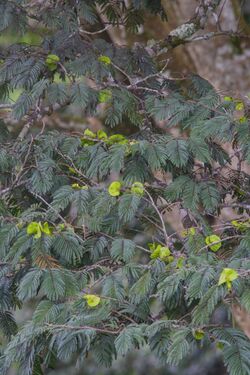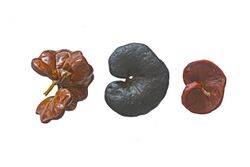Biology:Enterolobium schomburgkii
| Enterolobium schomburgkii | |
|---|---|

| |
| Enterolobium schomburgkii, unripe pods and foliage of a wild tree in Puerto López, Meta), Colombia | |
| Scientific classification | |
| Kingdom: | Plantae |
| Clade: | Tracheophytes |
| Clade: | Angiosperms |
| Clade: | Eudicots |
| Clade: | Rosids |
| Order: | Fabales |
| Family: | Fabaceae |
| Subfamily: | Caesalpinioideae |
| Clade: | Mimosoid clade |
| Genus: | Enterolobium |
| Species: | E. schomburgkii
|
| Binomial name | |
| Enterolobium schomburgkii (Benth.) Benth.
| |
Enterolobium schomburgkii is a species of flowering tree in the family Fabaceae.
Names
Enterolobium schomburgkii is also known as "dormidero", because of its minute leaflets reminiscent of Mimosa pudica. Mimosa pudica also called by a similar name ("dormidera").
Distribution
Enterolobium schomburgkii ranges from Central America to the Amazon basin and even further south.[1]
Description
Enterolobium schomburgkii differs from the similar, sympatric, Enterolobium cyclocarpum by smaller and smoother pods, and by its noticeably smaller, and more numerous leaflets. Unlike other species in the genus, seeds are smaller (<1 cm), its wood is reported to be denser than, for instance, Enterolobium cyclocarpum's.[2] and it is reported to bear fruit only every two to three years[3]
References
- ↑ Barneby, Rupert C.; Grimes, James W. (1996). "Silk tree, guanacaste, monkey's earring: a generic system of the synandrous Mimosaceae of the Americas. Part I. Abarema, Albizia, and allies.". Memoirs of the New York Botanical Garden 74 (1): 1–300.
- ↑ Lorenzi, Harri (2002). Trees of Brazil, vol. 2. Plantarum. ISBN 85-86714-15-1. https://www.plantarum.com.br/prod,idloja,25249,idproduto,3950735,livros-em-ingles-brazilian-trees-vol--2.
- ↑ Izawa, Kousei (1979). "Foods and feeding behavior of wild black-capped capuchin (Cebus apella).". Primates 20 (1): 57–76. doi:10.1007/BF02373828.
Wikidata ☰ Q10280344 entry


